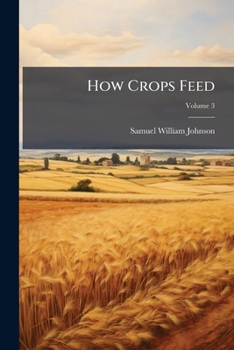How Crops Feed
"How Crops Feed" by Samuel William Johnson is a detailed exploration of the atmospheric and soil conditions necessary for optimal agricultural plant nutrition. This volume delves into the intricate relationship between crops and their environment, offering insights into the specific nutrients plants require and how they obtain them from the soil and the air.
Johnson's work examines the chemical processes involved in plant growth and the factors that influence these processes. It provides a comprehensive overview of agricultural science, making it a valuable resource for students, researchers, and practitioners in the field.
This treatise is essential for anyone seeking a deeper understanding of the science behind crop cultivation and the importance of maintaining healthy soil and atmospheric conditions for successful agriculture.
This work has been selected by scholars as being culturally important, and is part of the knowledge base of civilization as we know it. This work was reproduced from the original artifact, and remains as true to the original work as possible. Therefore, you will see the original copyright references, library stamps (as most of these works have been housed in our most important libraries around the world), and other notations in the work.
This work is in the public domain in the United States of America, and possibly other nations. Within the United States, you may freely copy and distribute this work, as no entity (individual or corporate) has a copyright on the body of the work.
As a reproduction of a historical artifact, this work may contain missing or blurred pages, poor pictures, errant marks, etc. Scholars believe, and we concur, that this work is important enough to be preserved, reproduced, and made generally available to the public. We appreciate your support of the preservation process, and thank you for being an important part of keeping this knowledge alive and relevant.
Related Subjects
Engineering Nature Science Science & Math Science & Scientists Science & Technology Technology




